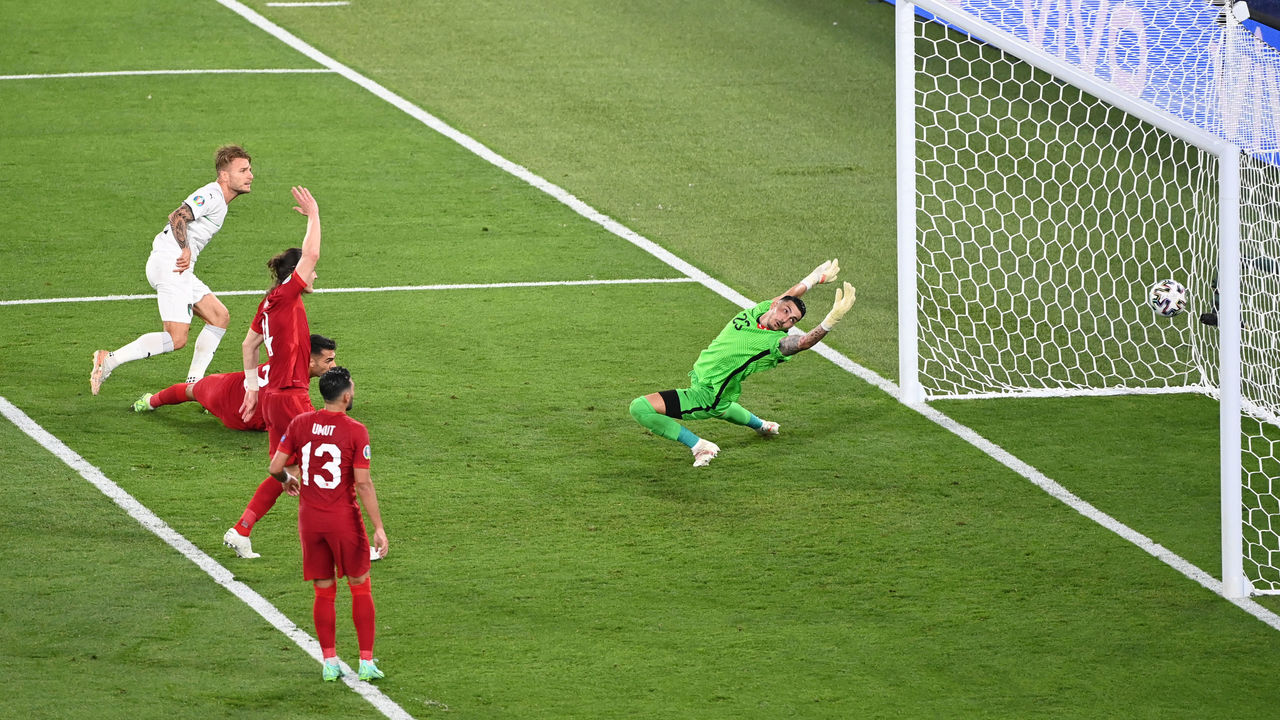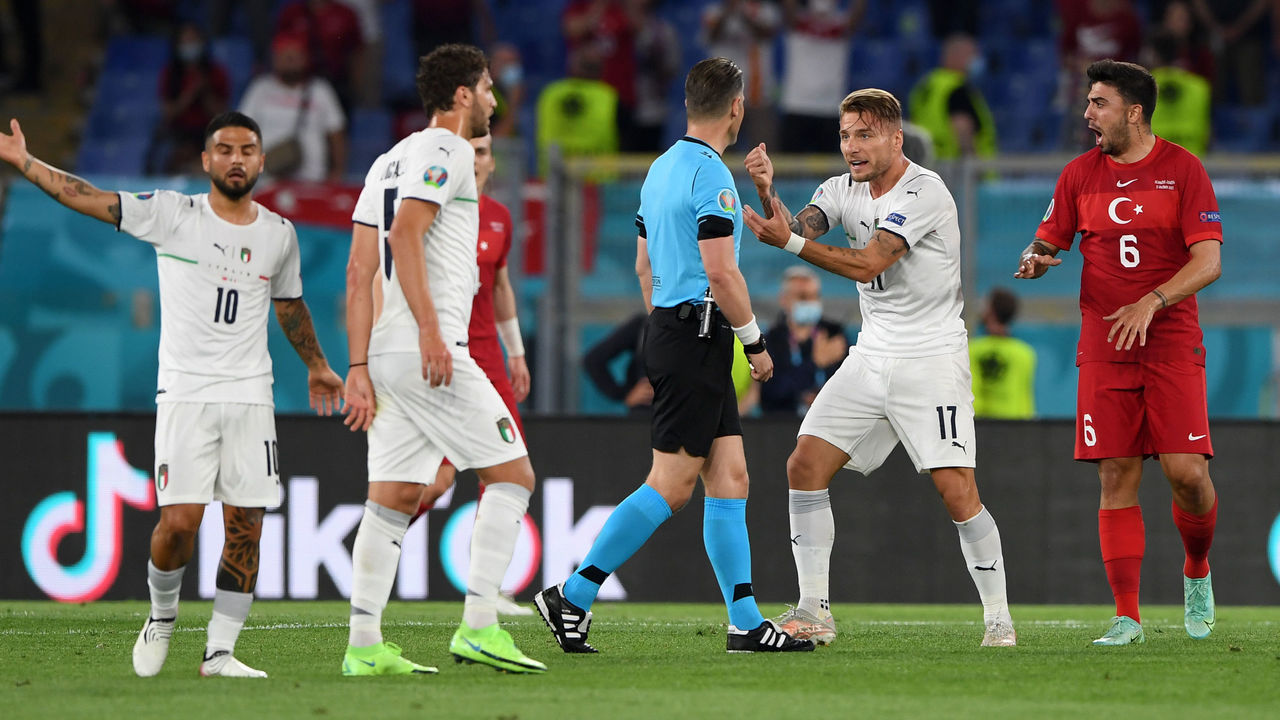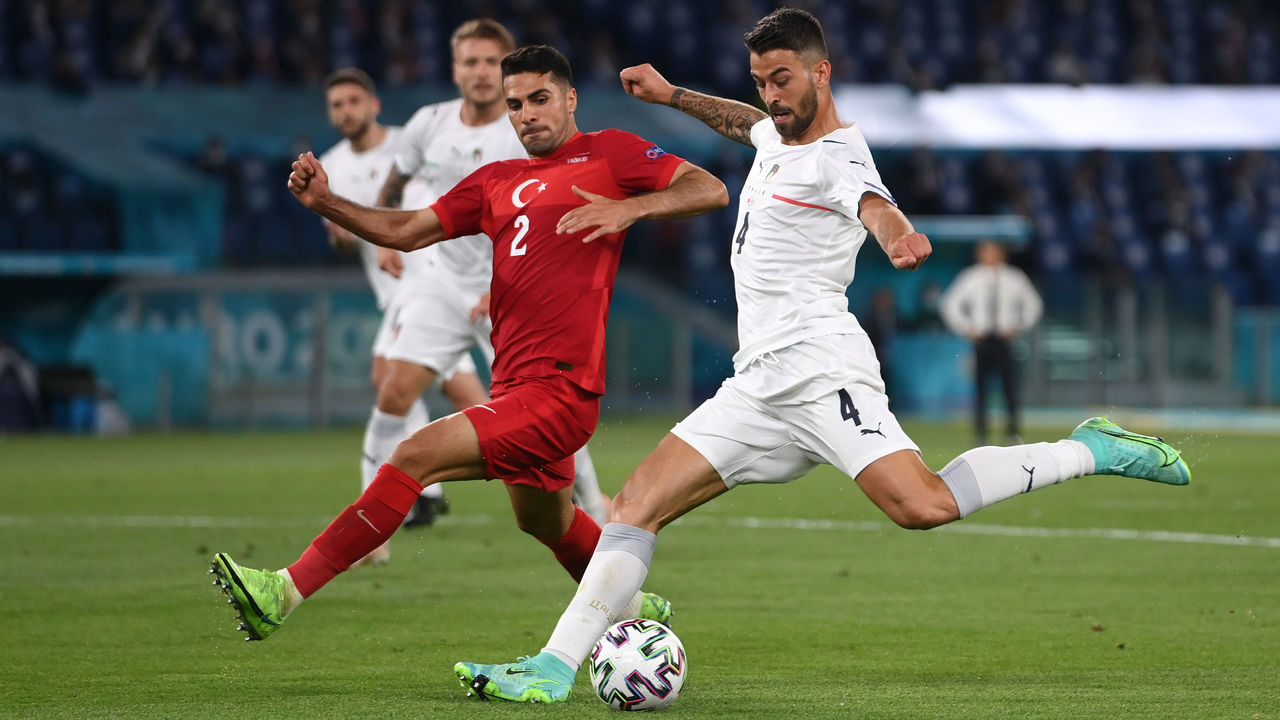5 takeaways from opening day of Euro 2020
One year later, Euro 2020 is finally underway. At the end of every matchday, we'll be dissecting the biggest talking points from all the action. Below, we look back on the opening day.
Immobile starting to silence the critics
When Italy failed to qualify for the 2018 World Cup, the critics, in desperate need of a scapegoat, circled around Ciro Immobile. It nearly ruined him. Even if Immobile didn't do anything wrong, he didn't do what many expected him to do. In a country like Italy, where winning is all that matters, it's the worst possible indictment.
How could he score so much for Lazio but not for Italy? The question was valid, and ever more baffling, until recently. Immobile's goal on Friday was his fourth in his last five international appearances. It was his first at a major international tournament, and well-taken, too - a snapshot off of a rebound that required cunning, alertness, and good body shape.

The headlines about his goal-scoring ability, or lack thereof, miss a crucial point. By his own admission, Immobile isn't a super technical striker or even the most gifted finisher, but he's aware of his surroundings, prodding until he finds an open lane. The 31-year-old is an incredible passer for someone in his position, and when he gets the ball, he holds up play long enough for his teammates to get involved. He's a team player, and he proved it Friday with an unselfish pass to Lorenzo Insigne for Italy's third goal.
Now that he's scoring when it matters, maybe his critics will gain an appreciation for the rest of his game.
Turkey's cautious approach backfires
Turkey was never going to win style points at the Euros. Head coach Senol Gunes built his team around a rock-solid defense - and it worked for a long stretch. Turkey collected eight clean sheets in qualifying and limited trigger-happy France to just a single goal over two matches.
But Turkey's performance in Rome was conservative even by its risk-averse standards. It did the visiting side more harm than good.
Turkey didn't attempt a single shot until the 51st minute, and Gunes' men didn't look all too concerned about keeping the ball at any point. Pressing, usually a necessity when out of possession, was pretty much non-existent. Turkey just sat back, allowing Italy's eager attackers to dictate the tempo. The home side waited until it found an opening, and after firing a few warning shots, it blew right through. It was less a resistance from Turkey as it was a hope and a prayer.
Turkey's first-half shot chart. #EURO2020 pic.twitter.com/EZ7zZ7JxC5
— Paul Carr (@PaulCarr) June 11, 2021
Turkey didn't even play well defensively. By the end of the night, it had allowed three goals - as many as it had conceded in all 10 of its Euro qualifiers. Merih Demiral looked lost and confused as he chested the ball into his own net, and goalkeeper Ugurcan Cakir's poor pass led directly to a goal.
Maybe Gunes believed his team could nick a point if it defended with two blocks of four. But it invited pressure against the wrong team. This generation of Italians prefers to be on the front foot, and though they showed a bit of frustration in the first half, with a number of players clamoring for penalties, they kept on running down the channels, delivering dangerous balls into the area and creating genuine scoring chances.
Now, Turkey has little hope of finishing atop Group A, which many would have considered a distinct possibility with a win or even a point Friday. But to change its fate, it doesn't need to go all kamikaze. It just needs a plan, which was painfully absent at the Stadio Olimpico. Wales and Switzerland are Turkey's remaining foes, and they lack the individual talent that Italy has. Defend with purpose, press and counter, and maybe Turkey can salvage something from this tournament. But the margin for error is now razor-thin.
New handball rule causes confusion
The Italians were convinced they had won two penalties in the first half. One was most certainly not - the ball hit Turkish defender Caglar Soyuncu in his midriff - but the other was more convincing. Leonardo Spinazzola's cross appeared to touch Zeki Celik's arm, which seemed to be in an unnatural position. His arm wasn't close to his body or in mid-stride. Match official Danny Makkelie ended up waving the play on, and the Video Assistant Referee needed a few seconds to confirm the call. It appeared Italy had lost a legitimate argument.

Their gripe was understandable: the vast majority of Italians saw similar handballs given as penalties in Serie A last season. But the law is changing, and UEFA is telling its referees to enforce the new rule at the Euros. Now, it's harder to penalize a handball by a defensive player. A handball can only be considered if the player's arm is in an unexpected position, or in a position that can't be justified by the player's natural movement. Previously, a referee could award a penalty for any handball below the short-sleeve area, intentional or not.
Players will need some time to adjust to the rule change, and as it's enforced, expect more to have the same reaction as the Italians did on Friday.
Spinazzola a vital outlet for Italy
Jose Mourinho probably doesn't get giddy too often, but the incoming Roma manager must surely be excited after the performance of Spinazzola on Friday. The Italian left-back was sensational against Turkey, his influential display earning him Man of the Match honors.
Quick, clever, and two-footed, Spinazzola is a vital outlet for Roberto Mancini's side. Classy as the Azzurri's three-man midfield is - and it was excellent in the tournament opener - Mancini's system means the trio can't really offer any width. With diminutive left-winger Insigne often cutting inside and trying to find his way into the penalty area, that leaves Spinazzola to provide almost all the width on that side of the pitch.
He did it superbly.

Italy's four-man defense typically converts into a back-three in possession, which gives Spinazzola the freedom to get forward. His ability to use both feet is key when he gets around the penalty area. The 28-year-old can slice inside onto his right foot and link up with the forwards, or, more often, he uses a hop-step hesitation to freeze the defender before scampering toward the end line and putting in a cross with his left foot; that exact move almost resulted in Italy being awarded a penalty in the first half.
Crucially, he didn't shirk his defensive duties, either. Despite often being encamped in the Turkish half, he raced back on numerous occasions to win back possession when one of Italy's countless attacks were stymied, allowing the Azzurri to regain the ball and venture forward again.
So much focus going into the competition has, understandably, been centered around Italy's outstanding trio in the middle, but Spinazzola's explosiveness down the flank will be critical if Mancini and Co. are to make a deep run.
Bocelli was the best performer on the pitch
The opening ceremony ahead of any major international tournament is often melodramatic and unnecessary; after such a long wait for the action to begin, nobody needs to sit through 30 minutes of tedious musical performances.
But this was different.
Iconic tenor Andrea Bocelli had every Italian on the planet ready to run through a brick wall after his latest rousing rendition of "Nessun Dorma." Honestly, they could have skipped the match altogether after that and many fans probably would've been just fine with it.
Andrea Bocelli singing Nessun Dorma 🎤
— ESPN FC (@ESPNFC) June 11, 2021
The perfect way to start Euro 2020 🙌 pic.twitter.com/L0l9Wy1AhL
That was followed by the Italian players' typically boisterous singalong to their national anthem. And then there was the small matter of the match itself. Italy, both the team and the country, couldn't have hoped for a better opening to Euro 2020.
"It was a beautiful evening," Mancini said after the victory. He was speaking about the game, of course, but he was right on multiple levels.
HEADLINES
- Bodo/Glimt blitz Inter to extend fairytale Champions League run
- Latest transfer news and rumors: Griezmann going to MLS?
- Dortmund criticize police treatment of fans ahead of UCL match in Italy
- D'Aversa replaces Baroni at troubled Torino
- Kean scores again to help Fiorentina beat Pisa, climb out of drop zone